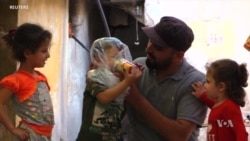The leaders of Russia, Turkey and Iran are scheduled to meet Friday in Tehran under the so-called Astana format to discuss the fate of the Syrian province of Idlib, the last rebel-held area of the country.
There are fears that Syrian and Russian forces are about to launch a big offensive, which likely would trigger a humanitarian catastrophe and set up a confrontation with Turkish-backed rebels. Russian and Syrian forces have conducted airstrikes on targets in Idlib this week.
About 2.9 million people live in Idlib province, the last stronghold for Turkish-backed rebel forces and rival anti-Assad groups, including the al-Qaida-linked militant group Hayat Tahrir al Sham. The showdown is part of Syria and Russia’s long-term strategy, according to Syria analyst Kyle Orton.
“They packed them all into Idlib so that when it came time for this final showdown, they could frame the offensive in the language of the war on terror. Their target, though, is the civilian population that rose against Assad seven years ago. The aim is to finish off the rebellion and to re-establish total control of the country.”
Humanitarian crisis
The United Nations’ Syria envoy, Staffan de Mistura, warned this week of an impending humanitarian crisis of epic proportions.
“That’s why I appeal, if I may, to President [Vladimir] Putin and to President [Recep Tayyip] Erdogan to talk and go beyond, perhaps, technical discussions and find a solution,” de Mistura said.
Turkey has stepped up its military presence in Idlib and along the Syrian border, raising the stakes in the proxy war for control of Syria, according to Orton.
WATCH: Fears of Bloodbath in Syria's Idlib as Russia, Turkey, Iran Meet
Dilemma for Russia and for Turkey
“It does bring this confrontation, because the Russians have been able to so far have allies, or good relations with Iran and Assad in Damascus, with Israel and with Turkey. Now, they’re made to choose between two partners — Turkey, and Assad and Iran — in Idlib. They’re trying to finesse it by creating a deal that hands over the province to Assad and Iran without a conflict.”
Whether Erdogan would accept such a deal remains to be seen.
“If Turkey could be sure that the PKK wouldn’t come into Idlib, there’s a chance they would do that. And if they weren’t going to be flooded with refugees as well, they may well go for something like that. The problem is that the Iranians and the [Syrian] regime have started training the PKK and advertising the fact that they’re coming in with their troops,” Orton said.
Observers say Western inaction has left the United States and its allies as peripheral to Idlib’s fate, which looks set to be decided by Moscow, Ankara and Tehran.
U.S. President Donald Trump said this week the world is watching the actions of the Syrian government and its Iranian and Russian backers, and warned the U.S. would, in his words, “get very angry” if there is a slaughter.







